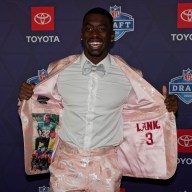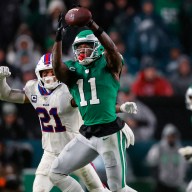Hilarie Burton wants you to make a movie in the Hudson Valley. The “One Tree Hill” alumna moved there almost four years ago, once she and her husband, fellow actor Jeffrey Dean Morgan, had their son. Previously they lived in Wilmington, North Carolina — a small town famous for attracting shows and movies (including “One Tree Hill”). She wants that luxury again, especially since the Hudson Valley is a hotspot for actors; other locals include Juliana Marguiles, Vera Farmiga and Paul Rudd. In fact, she and Mary Stuart Masterson just lobbied for the area, not far from New York City, to change their tax incentives, therefore making it more attractive for big productions. And if it works, she’ll be back to short work commutes. That’s what happened with “Growing Up Smith.” The new dramedy, about a young Indian boy (Roni Akurati) whose family relocates to an American suburb in 1979, was shot not far from her home. Burton plays Nancy, the stay-at-home mom of the girl who falls for our hero, whose husband (Jason Lee) sometimes has trouble making ends meet. Burton, 34, talks to us about small towns, growing up in a diverse community and being able to dress like her mom circa 1979.
Did you grow up in a small town like this? RELATED: Interview: Robert De Niro and Leslie Mann on “The Comedian” and laughing at Trump That happens to a lot of my friends who have kids: They become parents and they ditch the city. And then they find they actually like the suburbs.
I feel like everyone in Manhattan who goes to martini lounges go out to the Hamptons. Everybody who goes to dive bars moves to the Hudson Valley. It’s a real, gritty, cool, get-your-hands-dirty kind of environment. You do it for your kids, so their childhood is magical and awesome. Maybe that’s why I was drawn to the character I play in this movie, because she’s all about what’s right for her kid. She’s not all over the script, but when she shows up it’s a powerful moment, because of the realism of her story — that not everything is shiny and happy, even though you try to put on that front. Her struggles to do right by her daughter and deal with her sometimes irresponsible husband, to make sure there’s money for dinner — it’s not all fun for her. Being a mom’s hard! I basically based her around my mom. My mom has a high school education and she raised five kids when she was young. Then she decided she wanted better for us. My dad was always supportive of the choices she made. So she started working at a grocery store. Then she thought, ‘I can do better than this.’ She got a job as a school bus driver, so her hours would time up with ours. Then she became a kindergarten teacher’s aide. Then she went to real estate school. She became an award-winning real estate agent. Now she’s killing it. I think Nancy’s at the beginning of that journey. She’s like, “I can do better!” That’s a fun part to play, when someone’s in a transition phase like that. We both grew up in the ’80s, which is when a lot of stay-at-home moms started returning to the workforce, and then kicked ass at that.
It was a big deal. Back then working women were either school teachers or they were frigid. [Laughs] To have this generation of mothers who thought, “Uh-uh, watch this. I’ll do it all” — it was great. Now you see daughters of those women taking a stand, like we saw the other day [ed. during the global women’s marches]. It’s good to travel back in time and play with the origins of those stories. I have no doubt Nancy and her daughter would have been marching the other day. The movie also paints an optimistic portrait of a largely white suburban community who don’t react in fear at the arrival of outsiders, minorities, immigrants. Given the chance, I’d like to think — maybe insanely — that most white suburbanites would be as open as the ones are here. So much media coverage has led people to think these are new issues. I grew up outside of Dulles Airport, which is a huge international airport. I wound up growing up in a very diverse community. There were lots of mean, blonde girls in my class who ostracized me because I was a weirdo who dressed all in black and did theater. So I sat at the ESL table, which was English as a Second Language. The girls who were kind to me and accepted me and were awesome and really smart were girls from Cambodia and Saudi Arabia and these wonderful places I had never heard of. They taught me cuss words in their languages. We created this bubble and we felt protected. I was so happy to grow up with people from so many different places. Not everyone is afforded that luxury. A lot of people grow up in areas where everyone is the same. Outsiders must be scary to them. What I love about this movie is it shows how scary it is to be the outsider, too. It’s very timely while still staying true to that era. What was your reaction to recreating 1979, which is a few years after you were born?
I remember seeing pictures of my mother in those years and thinking she was so glamorous. Her hair was on-point. The hot rollers were so glamorous, and so was the way she wore her makeup, her fuchsia lipstick. My mother would get ready about an hour before my dad came home from work. She would doll-up. For me, the idea was Nancy was trying to solve all the problems in her marriage by dolling-up. Then you slowly see that fade. She gets less and less dolled-up, because who’s she trying to impress anymore? It’s not working. It was fun to wear those clothes, though. Everything makes your ass look real big. I can’t wear it in real life. I’m not a hipster. I couldn’t get away with it. I’m a farm girl. So it was fun to be able to do that for the movie. There’s chicks in Brooklyn who wear that every day. For me it was a special occasion. If you come back to Williamsburg with those clothes, I’m sure you’ll fit right in. That will come back too. Hipsters will start getting their clothes from hardware stores once they find out hardware stores sell clothes.
I did, in the Blue Ridge Mountains of Virginia. I could not wait to get the hell out of there. So I applied to every college in Manhattan and went to the one that gave me the most money. We lived there until my son was about six months old. We wanted to raise him with access to a rural environment. We didn’t want him to be a bratty L.A. kid. When it was time for him to start school, we were like, “Hey, let’s live out there full-time.” So we moved to a big farm. We’re drinking the Kool-Aid, man. [Laughs]
Nah. If I can’t find it at a hardware store, I’m not wearing it. That’s where I do my shopping now. [Laughs]
Those bastards. Just know I was ahead of the curve.
Hilarie Burton on ‘Growing Up Smith’ and when moms went back to work
Follow Matt Prigge on Twitter @mattprigge


















